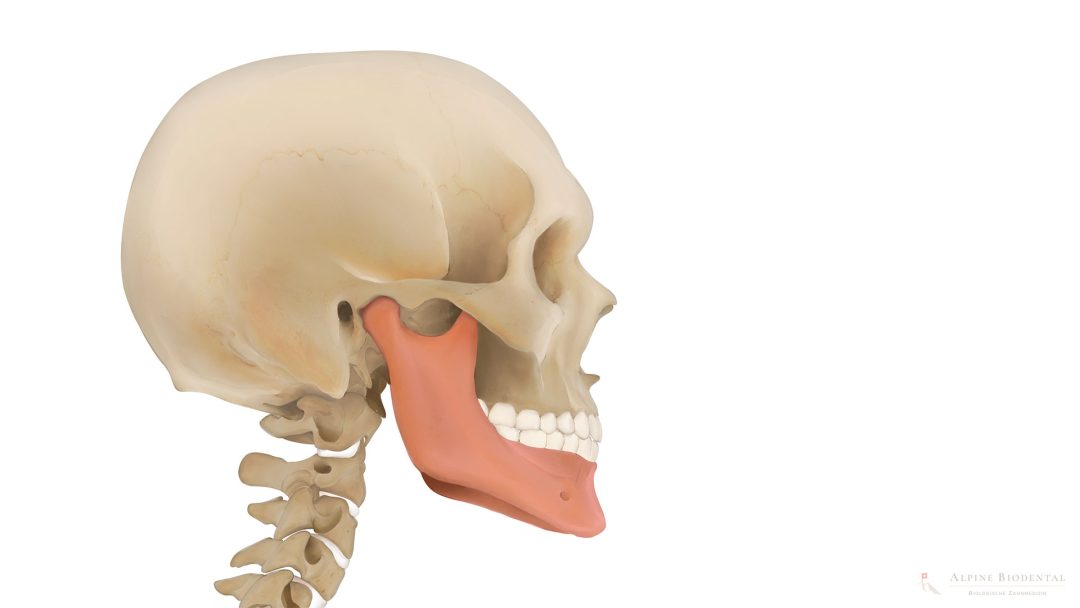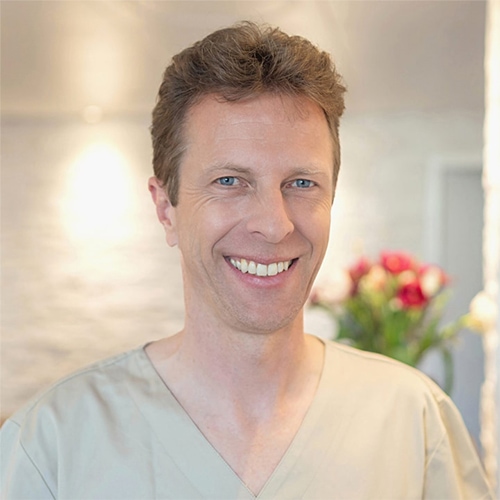Teeth Grinding

If you notice a cracking or grinding sound while chewing, the cause is usually found in the temporomandibular joints. Due to the proximity of the jaw joints to the ears, the cracking in the jaw joint can sound quite loud and unpleasant for those affected. However, not only can the volume be a problem, but long-term health consequences may also arise.
In this article, you will find important information about the causes, consequences, and treatment options for jaw cracking.
What is Jaw Cracking?
The widely used term “jaw cracking” is not entirely accurate because the cracking does not come from the jaw itself but from the temporomandibular joints. Consequently, it is referred to as temporomandibular joint cracking.
Cracking in the jaw joint describes a symptom that is detectable as a cracking or grinding noise during mouth movements. The classic cracking occurs due to a pathological structure of the temporomandibular joints, where there is an abrupt displacement of the cartilaginous disc (articular disc) located in the jaw joints during chewing movements. This disc displacement is perceived as pronounced jaw cracking.
In addition to cracking, a grinding noise in the jaw joint, similar to the sound of rubbing sand, can also be perceived. This phenomenon is caused by mechanical friction, which is also attributed to pathological structural changes in the temporomandibular joints.
Jaw Cracking While Chewing
Many affected individuals particularly observe jaw cracking while chewing or eating, which is due to the central position of the temporomandibular joints in the masticatory system. The grinding of food involves bringing the lower jaw teeth into contact with the upper jaw teeth, thereby crushing the food. This process requires a controlled movement of the lower jaw, with the temporomandibular joints forming the hinges for the lower jaw movement. If the bite is not correct, the temporomandibular joints are improperly stressed. Prolonged improper stress during chewing or eating leads to misalignment, destroying the structure of the temporomandibular joints.
Depending on the type of overload and the resulting destruction in the temporomandibular joints, cracking may occur unilaterally or in both temporomandibular joints. The high adaptability and compensatory ability of the temporomandibular joints mean that jaw cracking usually occurs without pain. However, in cases of pronounced problems in the temporomandibular joints, cracking and pain can occur together.
Origin and Causes of Jaw Cracking
A anatomically healthy temporomandibular joint does not exhibit cracking and grinding noises. Particularly loud noises in the temporomandibular joints indicate persistent mechanical stress with damage to the internal structure. In the following, we will discuss the possible origin and causes of jaw cracking, distinguishing between natural and pathological origins.
Natural Cause
In the temporomandibular joints, there is also the phenomenon of tribonucleation. This is a natural occurrence, similar to what is experienced in finger cracking. When the finger joints are stretched, it creates a vacuum in the joint fluid in the joint space, causing suddenly released gases to escape from the fluid. This process is perceived as a cracking sound. In the jaw joint, such stretches, especially during wide mouth opening, rarely occur, resulting in audible cracking.
Pathological Causes
In most cases, jaw joint cracking is one of many symptoms of Temporomandibular Disorders of the joints (TMJ), a widespread disorder of the masticatory system with long-term consequences for physical health. Due to the underlying incorrect bite in TMJ, structural changes occur throughout the masticatory apparatus, leading to damage to the temporomandibular joints, causing them to function less smoothly.
The pathological changes in the temporomandibular joints that can explain cracking and grinding in the jaw are described below.
Disc Displacement
The temporomandibular joint is formed by the lower jaw and the skull base. Between the bony structures with their cartilage covering is a movable cartilaginous joint disc (articular disc), serving as a cushion and improving force distribution in the temporomandibular joints. When the mouth is opened, the disc can be pressed out of its correct position (cracking sound when opening the mouth) and can spring back to its original position when closing the mouth (cracking sound when closing the mouth).
Due to pathological force distribution in the temporomandibular joints, disc displacement, if left untreated, can lead to permanent damage to the temporomandibular joints. It is crucial that the disc is repositioned and stabilized by an experienced TMJ specialist.
Degeneration
A temporomandibular joint consists of rounded and well-sliding structures, minimizing friction during mouth movement. With gradual destruction of the bony and cartilaginous structures, degenerative changes occur in the temporomandibular joint, causing increased friction and resistance with every movement of the lower jaw. This friction is then perceivable as crepitation (crackling or grinding).
Degeneration of the temporomandibular joint is referred to as temporomandibular joint arthrosis and should be treated by an experienced TMJ therapist.
Inflammation in the Temporomandibular Joints
Inflammation in the temporomandibular joints is not only painful but can also lead to massive destruction of joint anatomy over time. Inflammations in the temporomandibular joints are called temporomandibular joint arthritis and can cause severe pain in the temporomandibular joints. Since inflammations in the body mutually reinforce each other, additional jaw inflammations, FDOJ/NICO, and Rantes can further adversely affect the course.
Therapy of Jaw Cracking
Many wonder what to do about jaw cracking and how to get rid of it. The first step is to determine the actual cause and whether it is a problem requiring treatment. For this, a dentist specializing in bite issues is the first point of contact. If it is a pathological situation that requires treatment, the cause of the incorrect bite (often in the context of TMJ) should be treated causally and stabilized in the long term. Symptomatic therapies, on the other hand, may provide temporary relief but are not a sustainable solution.
TMJ Therapy
Craniomandibular Dysfunction of the joints (TMJ), mostly caused by an incorrect bite, can only be eliminated if treated causally. Since the anatomically and functionally incorrect bite causes structural changes in the temporomandibular joints, therapeutic intervention should focus precisely on this point. Complete regeneration of the temporomandibular joints with a specialized TMJ splint and subsequent correction of the bite situation is the only permanently promising solution.
Read more about this in the TMJ article.
Jaw Joint Surgery
Jaw joint surgery carries a high risk and potential complications. Conditions justifying such surgery are exclusively extreme destruction of the jaw joints due to tumors, accidents, or other severe illnesses. Even “minimally invasive” surgical interventions on the jaw joints are not recommended for jaw cracking. Gentle guidance of jaw joint regeneration with subsequent adjustment of tooth anatomy, on the other hand, is an appropriate, causal, gentle, and effective therapy for the root cause, which should always be preferred. The implementation of such causal therapy must be carried out by a specially trained dentist with expertise in this field.
Home Exercises
Exercises that you can perform at home focus on stretching and relaxing muscles, tendons, and ligaments. Such methods may provide some symptomatic relief for TMJ symptoms. However, exercises do not address the root cause, making the problem not permanently resolved.
Dr. med. dent. Markus Spalek
Increased mechanical forces on the jaw joints during jaw cracking can lead to permanent damage. Through our TMJ therapy, we can regenerate the jaw joints and keep them healthy in the long term.

Frequently asked Questions about Jaw Cracking
Jaw cracking often raises a lot of uncertainty for those affected, leading to many questions. Here, we address common questions about jaw cracking.
Jaw clicking is often not accompanied by pain. However, whether the temporomandibular joints have already suffered permanent damage can be determined by an experienced TMJ specialist using TMJ diagnostics. An appointment with an expert is recommended.
Yes. A TMJ splint can treat the cause of jaw cracking. Treatment with a TMJ splint is a process, with the splint being adjusted according to the progressive regeneration of the jaw joints.
In many patients, jaw cracking occurs unilaterally, indicating that the cracking jaw joint has more significant structural damage than the other. The cause may be an asymmetrically shifted bite.
Jaw cracking is usually a symptom of a dysfunction of the masticatory system (TMJ) but can be associated with additional symptoms. Prolonged friction in the jaw joints can favor other symptoms of TMJ, such as jaw pain, headaches, migraines, neck and back pain.
To answer this question, the cause of jaw cracking must be identified. If TMJ is the cause, complete remission without causal treatment is unlikely. However, with proper TMJ Therapy, jaw cracking can be completely eliminated.
If you experience long-term jaw cracking, you should consult a dentist specially trained and experienced in treating TMJ.
For jaw cracking, an appointment with a dentist should be made. It is important that the dentist is specifically trained and has extensive experience in treating TMJ.
Jaw cracking while yawning can have various reasons. Stretching in the jaw joint can suddenly release gas from the joint fluid, causing cracking. In this case, you only hear a crack when opening. If cracking is also heard when closing, it often indicates disc displacement. If cracking or grinding is heard during normal chewing, the cause should be investigated.
After a wisdom tooth extraction, jaw cracking may occur, possibly related to keeping the mouth open during the procedure. In our practices, we emphasize ensuring that the treatment is not overly extended, allowing you to close your mouth and relax in between, thus avoiding jaw cracking after wisdom tooth extraction. If the lower jaw was excessively weakened after the wisdom tooth extraction, a painful jaw fracture can occur very rarely—a one-time crack with pain and swelling as a result. Fortunately, in our practice, we have so far been spared from this risk occurring.
The use of braces can shift teeth and alter the bite. The new bite situation may lead to increased stress in the jaw joints, resulting in jaw cracking. If it doesn’t improve permanently, you should contact your dentist or orthodontist. If they cannot eliminate the cause, consult a dentist specially trained and experienced in this area.
It’s possible that you may have dislocated your jaw. In such a case, the teeth may not align as well, and the mouth may not close completely. It could also be a disc displacement. If the pain persists and the bite feels shifted, consult a dentist specifically trained and experienced in treating dysfunctions (TMJ).
We advise against attempting to reset the jaw yourself. Incorrect actions can lead to permanent damage to the jaw joints.
The reason for sudden jaw cracking can’t be easily determined because various factors could be causing it. Consult your dentist or seek out a dentist specially trained and experienced in treating dysfunctions (TMJ).
Temporary self-help may involve performing different exercises that stretch and relax the structures of the masticatory system.
TMJ is a common cause of jaw cracking. Prolonged misalignment of the jaw joints can lead to destruction of the internal structure and, consequently, the noises in the joints.
If the jaw joint cracks, rubs, or grinds, it can be audibly noticeable due to its proximity to the ear. Consult a TMJ specialist to determine the cause of the jaw noises.
Jaw cracking is not a direct cause of headaches and migraines but can contribute to them. A common cause of headaches and migraines is TMJ.
No, tension in the jaw muscles does not result directly from jaw cracking. Muscle tension indicates an anatomically incorrect bite situation. A TMJ specialist can provide assistance.
Further information
Here, you can find additional information on the topic to gain a deeper insight.